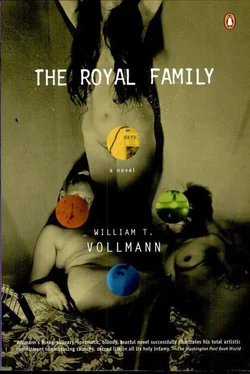Am I my brother’s keeper? asked Cain, but Tyler (such is history, such progress) no longer thought to ask. This dereliction had to do less with any childhood offenses which his brother might have committed than with a mutual antipathy almost chemical in its inarguability, reinforced by the many successes of John in business. Unlike Cain’s, Tyler’s jealousy never drove him to the commission of actual evil (which would, as we’ve agreed, require backbone). The nature of the brothers’ relations promoted aloofness rather than feuds. And propinquity did not even permit open disregard. There was, in the first place, their mother to be placated. She lived a mere hour and a half away, in Sacramento, which inevitably branded their existence with periodic family gatherings. Both Tyler and his brother dwelled and worked in San Francisco, that ingrown little city which with improbable regularity draws friends, relatives, and other enemies across one another’s path. What could they do? Most of all, of course, there was Irene, thrilling, perturbing, and — he granted it — strangely conventional almost to the point of shallowness — but he loved her for her gentleness, her acceptance of him, and her easily satisfied neediness. No doubt the illictness of his feelings deepened them, in consequence not only of human nature but also of the corruption of his voyeuristic occupation. Tyler hunted for people and stalked them, mostly because they were doing something wrong or because somebody refused to trust them. (If I get hired, that means something just went wrong, he liked to say. This has gotta be a low point for my client.) Even the rare missing persons cases which he took on had little to do with love or a yearning for reunification. Only once in his fourteen-year career had he ever done anything as pleasant as put a lady in touch with her old sweetheart.
The search for the Queen of the Whores typified his bread and butter. Mr. Brady, he was sure, had no particularly honorable or romantic motive in seeking her. The narrow omnipotence which Tyler rented out to his clients came to inform his own heart with a dreamy absence of scruples, and a habit of perceiving from a too professional standpoint anyone who interested him. This is not to imply that he spied on Irene, nor that Irene’s own qualities had nothing to do with attraction — for she was truly unique, not in her character but in her soul. And she was wounded; her soul cried like a wounded bird’s, and he heard the cry. John did not hear, at least not anymore. Isn’t that the natural outcome of marriage? John committed small and egregious rudenesses toward her family — an excellent way to make an Asian woman suffer even to the point of weeping. One February weekend Irene’s parents threw a birthday party for John, and John showed up with someone who claimed to be an old college friend who looked critically at the food and asked: Is this event catered? — No, said Irene’s sister Pammy. Mom and I cooked it all ourselves. — Oh, the woman said. I didn’t think it was catered. No wonder there’s nothing here worth eating. — A look of disgust flashed across John’s mouth, but he said nothing. Irene wanted to cry then for her sister’s sake. She said to Tyler (who of course hadn’t been present) that she didn’t care when she was walking down the street alone and some white person said: Will you look at that Chink! but when anyone insulted her sister or her parents in her presence, it was all she could do not to attack. She said that she must be a very bad person because she often felt such impulses. Tyler, slowly shaking his head, wondered if that meant that she often got called a Chink. He thought to himself that there couldn’t have been any human being more special and good than Irene. It hurt him to see how John treated her. Had he also cause for grievance, Tyler wondered (knowing from his work as well as from his own memories the wretched secrets which may infest domestic life), or was John simply morally inanimate? John was so cold with her — unconfiding and unhappy!
Irene said that once she’d asked her husband why he didn’t divorce her if he felt so miserable, and he just turned toward her with a weary look and said: Because I know you’ll take good care of me.
Don’t you think that’s wrong? Irene said.
Oh, he’s trying to be nice. That’s just John’s way…
But isn’t it wrong?
It’s too bad, honey, said Tyler, stroking the back of her neck. It’s really a shame. Remember, I told you how it would be before you got married.
I know. I’m sorry.
Don’t be sorry, sweetheart, he said, embracing her. She kissed him passionately on the lips.
It was a fresh cold winter’s eve of shiny raincoats and headlights of stalled traffic like luminous pairs of dinner plates stood on their edges; the pavement had become an ebony liquid which reflected upside down the people walking on it, stuck by the soles of their shoes to their inverted selves. Tyler had invited Irene and John out to dinner, knowing that John would be too office-burdened to attend. Sometimes he wondered if his brother were angry at him, or grateful for taking Irene off his hands, or simply oblivious. Mostly he tried not to think about it. They were walking down Geary Street now and Irene was squeezing his hand. He wanted to put her fingers into his mouth and suck them one by one. They strode along in happy silence. Tyler felt everything to be proceeding as it should. No surprises would frighten him.
Among those Japanese restaurants on the edge of the Tenderloin he had chosen one called Kabukicho. The client who’d first taken him there, an old Japanese banker very correctly jealous of his young wife, had been amused by the resonance of such a name in this place, for Kabukicho is one of Tokyo’s red light districts. Tyler had smiled uncomfortably, fitted his fingers together, scratched his poorly shaved chin, collected his check, passed across the table the sealed white envelope of color photographs which documented just what the wife had been doing for three days and three nights in the Nikko Hotel, and pretended to be as amused by those photos as the banker strove to be — gleam of spectacles, gleam of teeth, wide carnivorous mouth! Then the banker said: What do you usually say to the client under these circumstances? — Oh, I don’t know, Tyler muttered, rubbing his chin. I remember this gal who sent me to check on her husband. She calls in tears at eleven at night, her life’s destroyed. Just, you know, I’m not a shrink, I don’t know what to say. I’m sorry it happened. I guess that’s what I usually say… — He never saw the banker again. That had been good money, with which he’d bought a new computer, coaxed his car into compliance with the smog inspection, reduced two of his most pressing credit card debts and paid rent for two easy months. Kabukicho thus offered good associations, not to mention good food. He also liked the polite, well-ordered bustle of the place. The clocks were sashimi dashboards and everything was neat, Asian businessmen flipping open their cellular phones, earnest young white social-democratic couples singing out: Thank you very much! as they went out the exit, squeezing past the line of rich and hungry folks sliced multiply by the blinds through which could be seen pink and green neon reifications of Tyler’s loneliness across the street.
The sign said: SORRY — NO RESERVATIONS ACCEPTED. Tyler led his date to the head of the line and said: Excuse me; we had a reservation for two. — The waiter studied him without comment until Tyler drew from his wallet an embossed silver card which the Japanese banker had given him. The waiter accordingly clasped his hands and led them to the far end of the sushi bar, where a potted bamboo obscured them from the cardless vassals whom they had cut. Irene giggled with pleasure and squeezed Tyler’s arm.
Читать дальше












